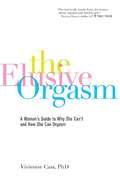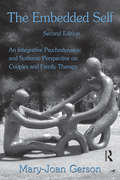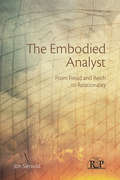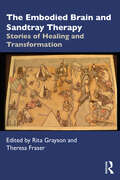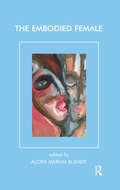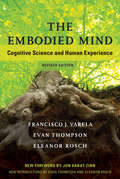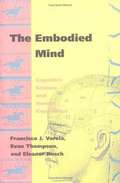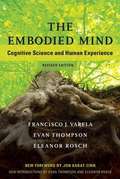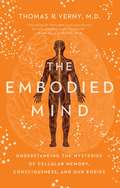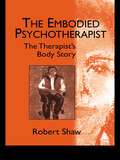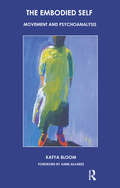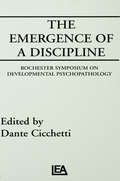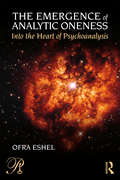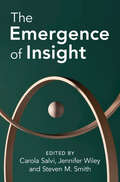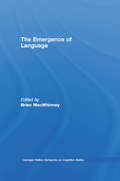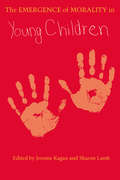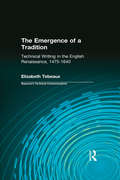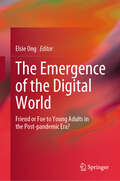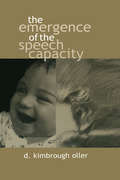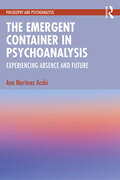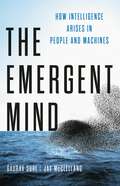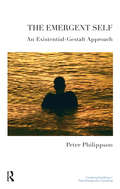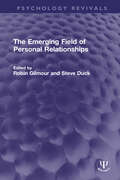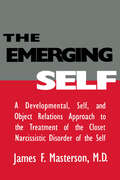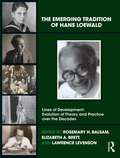- Table View
- List View
The Elusive Orgasm: A Woman's Guide to Why She Can't and How She Can Orgasm
by Vivienne CassAre you one of the thirty percent of women who has difficulties with orgasm? Do you want to experience greater sexual satisfaction? In easy to read language, The Elusive Orgasm provides a full overview of women's sexual pleasure, covering sexual triggers, stages of arousal, the power of mind, and how women differ from men. Longtime clinical psychologist and sex therapist Dr. Vivienne Cass reveals all the causes of women's orgasm difficulties - and how to remedy them. In The Elusive Orgasm, you'll learn: What an orgasm is How the clitoris is much more than "a little button" The stages of a woman's arousal The five types of orgasm difficulties The twenty-five causes of those difficulties Self-awareness via quizzes and questionnaires Sexual and non-sexual changes to help you orgasm Step-by-step plans to help you and your partner An extraordinarily thorough, all-inclusive exploration of every possible reason why women have orgasm challenges, The Elusive Orgasm gives you the tools to discover the source of your own orgasm difficulties, along with straightforward remedies.
The Embedded Self: An Integrative Psychodynamic and Systemic Perspective on Couples and Family Therapy
by Mary-Joan GersonFirst published in 1996, The Embedded Self was lauded as "a brilliant and long overdue rapprochement between psychoanalysis and family therapy conceived by a practitioner trained and experienced in both modalities of treatment." Mary-Joan Gerson’s integrated presentation of psychodynamic and family systems theory invited therapists of either orientation to learn the tools and techniques of the other, to mutual benefit. Firmly grounded in detailed case presentations, her focus on family therapy examined its history, organizing concepts, and developmental approaches, and addressed practical questions of diagnosis, clinical interaction, and referrals. A dozen years later, the psychoanalytic community is more open to integrating perspectives, and the growth of analysts working with couples and families necessitates an update of the material presented in The Embedded Self. Similarly, the family therapy community has deepened its interest in individual dynamics within systemic patterning. From a new and revised perspective on the possibilities of integration, Gerson covers the latest research in neuroscience and the transmission of affect within intimate relationships, with a new chapter on attachment theory and emotionally focused therapy. Sections on narrative therapy and psychoanalytically-oriented family therapy are expanded as well. The Embedded Self was a sterling introduction to family systems theory and therapy, and enhanced the work of analysts and family and couples therapists alike. The second edition proves no different in its context but wider in its scope, further enhancing the work of the family therapist interested in individual dynamics, and preparing the psychodynamically-oriented therapist who seeks to extend her craft from the dyad to the triad, and beyond.
The Embodied Analyst: From Freud and Reich to relationality (Relational Perspectives Book Series)
by Jon Sletvold2015 Gradiva Award Winner The Embodied Analyst brings together the history of embodied analysis found in the work of Freud and Reich and contemporary relational analysis, particularly as influenced by infant research. By integrating the ‘old’ embodied and the ‘new’ relational traditions, the book contributes to a new clinical perspective focusing on form and process rather than content and structure – the ‘how’, rather than the ‘what’ and the ‘why’. This perspective is characterised by a focus on movement, emotional interaction and the therapists own bodily experience in the analytic encounter. Jon Sletvold presents a user-friendly approach to embodied experience, providing the history, theory, training and practice of embodied experience and expression as a way of expanding clinical attention. Starting with a Spinozan view of the embodied mind, Part One: History of Embodied Psychoanalysis presents an overview of the history of the field in the works of Freud and Reich as well as a look at the Norwegian Character Analytic tradition . Part Two: Conceptual Framework and Clinical Guidelines explains how clinical interaction can be navigated based on the embodied concepts of subjectivity, intersubjectivity and reflexivity. Part Three: Embodied Training and Supervision presents innovative approaches to training in emotional communication inspired by the performing arts. The book ends with a consideration of the embodied analyst in the 21st century consulting room. Capturing key aspects of a transitional movement in the development of psychoanalysis and psychotherapy, The Embodied Analyst is ideal for those working and training in psychoanalysis and psychotherapy.
The Embodied Brain and Sandtray Therapy: Stories of Healing and Transformation
by Rita Grayson Theresa FraserThe Embodied Brain and Sandtray Therapy invites readers to absorb the magic and mystery of sandtray therapy through a collection of stories. Woven throughout these pages is the neurobiological foundation for the healing and transformation that takes place during deep encounters with sand, water, and symbolic images. Such scientific grounding provides the basis for clinicians to understand how sandtray therapy supports their healing work. In addition to client stories, the authors have also bravely shared their personal experiences, both challenging and rewarding, of being sandtray therapists. Clinicians who are considering becoming sandtray therapists are given an inside peek into the learning journey and its many benefits. Those who are already practicing sandtray therapy will find this book both supportive and affirming.
The Embodied Female (Psychoanalysis and Women Series)
by Mariam AlizadeThe Embodied Female is the first volume of this series for the Committee on Women and Psychoanalysis of the International Psychoanalytical Association. This book brings together highly original and insightful contributions from an international group of renowned psychoanalaysts.
The Embodied Mind, revised edition: Cognitive Science and Human Experience (The\mit Press Ser.)
by Evan Thompson Francisco J. Varela Eleanor RoschA new edition of a classic work that originated the “embodied cognition” movement and was one of the first to link science and Buddhist practices.This classic book, first published in 1991, was one of the first to propose the “embodied cognition” approach in cognitive science. It pioneered the connections between phenomenology and science and between Buddhist practices and science—claims that have since become highly influential. Through this cross-fertilization of disparate fields of study, The Embodied Mind introduced a new form of cognitive science called “enaction,” in which both the environment and first person experience are aspects of embodiment. However, enactive embodiment is not the grasping of an independent, outside world by a brain, a mind, or a self; rather it is the bringing forth of an interdependent world in and through embodied action. Although enacted cognition lacks an absolute foundation, the book shows how that does not lead to either experiential or philosophical nihilism. Above all, the book's arguments were powered by the conviction that the sciences of mind must encompass lived human experience and the possibilities for transformation inherent in human experience. This revised edition includes substantive introductions by Evan Thompson and Eleanor Rosch that clarify central arguments of the work and discuss and evaluate subsequent research that has expanded on the themes of the book, including the renewed theoretical and practical interest in Buddhism and mindfulness. A preface by Jon Kabat-Zinn, the originator of the mindfulness-based stress reduction program, contextualizes the book and describes its influence on his life and work.
The Embodied Mind: Cognitive Science and Human Experience
by Evan Thompson Francisco J. Varela Eleanor RoschThe Embodied Mind provides a unique, sophisticated treatment of the spontaneous and reflective dimension of human experience. The authors argue that only by having a sense of common ground between mind in Science and mind in experience can our understanding of cognition be more complete. Toward that end, they develop a dialogue between cognitive science and Buddhist meditative psychology and situate it in relation to other traditions such as phenomenology and psychoanalysis.
The Embodied Mind: Cognitive Science and Human Experience
by Jon Kabat-Zinn Evan Thompson Francisco J. Varela Eleanor RoschThis classic book, first published in 1991, was one of the first to propose the "embodied cognition" approach in cognitive science. It pioneered the connections between phenomenology and science and between Buddhist practices and science -- claims that have since become highly influential. Through this cross-fertilization of disparate fields of study, The Embodied Mind introduced a new form of cognitive science called "enaction," in which both the environment and first person experience are aspects of embodiment. However, enactive embodiment is not the grasping of an independent, outside world by a brain, a mind, or a self; rather it is the bringing forth of an interdependent world in and through embodied action. Although enacted cognition lacks an absolute foundation, the book shows how that does not lead to either experiential or philosophical nihilism. Above all, the book's arguments were powered by the conviction that the sciences of mind must encompass lived human experience and the possibilities for transformation inherent in human experience. This revised edition includes substantive introductions by Evan Thompson and Eleanor Rosch that clarify central arguments of the work and discuss and evaluate subsequent research that has expanded on the themes of the book, including the renewed theoretical and practical interest in Buddhism and mindfulness. A preface by Jon Kabat-Zinn, the originator of the mindfulness-based stress reduction program, contextualizes the book and describes its influence on his life and work.
The Embodied Mind: Understanding the Mysteries of Cellular Memory, Consciousness, and Our Bodies
by Thomas R. VernyAs groundbreaking synthesis that promises to shift our understanding of the mind-brain connection and its relationship with our bodies.We understand the workings of the human body as a series of interdependent physiological relationships: muscle interacts with bone as the heart responds to hormones secreted by the brain, all the way down to the inner workings of every cell. To make an organism function, no one component can work alone. In light of this, why is it that the accepted understanding that the physical phenomenon of the mind is attributed only to the brain? In The Embodied Mind, internationally renowned psychiatrist Dr. Thomas R. Verny sets out to redefine our concept of the mind and consciousness. He brilliantly compiles new research that points to the mind&’s ties to every part of the body. The Embodied Mind collects disparate findings in physiology, genetics, and quantum physics in order to illustrate the mounting evidence that somatic cells, not just neural cells, store memory, inform genetic coding, and adapt to environmental changes—all behaviors that contribute to the mind and consciousness. Cellular memory, Verny shows, is not just an abstraction, but a well-documented scientific fact that will shift our understanding of memory. Verny describes single-celled organisms with no brains demonstrating memory, and points to the remarkable case of a French man who, despite having a brain just a fraction of the typical size, leads a normal life with a family and a job. The Embodied Mind shows how intelligence and consciousness—traits traditionally attributed to the brain alone—also permate our entire being. Bodily cells and tissues use the same molecular mechanisms for memory as our brain, making our mind more fluid and adaptable than we could have ever imaged.
The Embodied Psychotherapist: The Therapist's Body Story
by Robert ShawThe therapist's body is a vital part of the therapeutic encounter, yet there is an inherent inadequacy in current psychotherapeutic discourse to describe the bodily phenomena. Until recently, for instance, the whole area of touch in psychotherapy has been given very little attention. The Embodied Psychotherapist uses accounts of therapists' own experiences to address this inadequacy in discourse, and provides strategies for incorporating these feelings into therapeutic work with clients. Drawing on these personal accounts, it also discusses the experiences that can be communicated to the therapist during the encounter.This description and exploration of how practitioners use their bodily feelings within the therapeutic encounter book will be valuable for all psychotherapists and counsellors.
The Embodied Self: Movement and Psychoanalysis
by Katya BloomBy integrating principles from her background as a movement psychotherapist and movement analyst with key concepts from contemporary psychoanalysis, the author offers a new perspective on exploring the interrelationships between nonverbal and verbal 'articulation' in any therapy setting. The Embodied Self provides a practical and experiential working model for developing therapists' embodied attentiveness, which will enhance their recognition of the sensori-affective manifestations of transference and countertransference. It will inform the work of psychotherapists and psychoanalysts, dance movement therapists, and body psychotherapists, as well as those involved in psychoanalytic observational studies. It will also be of great value to anyone interested in exploring the interrelationships between the psyche and the body.
The Emergence of A Discipline: Rochester Symposium on Developmental Psychopathology, Volume 1 (Rochester Symposium on Developmental Psychopathology Series)
by Dante CicchettiCompiled from papers presented at the Rochester Symposium on Developmental Psychopathology, this is the first book of its kind devoted to disseminating theory and research in the field of psychopathology. Contributions to this text are unified by their incorporation of developmental principles into the study of various types of emotional disorders in children and adults. Also emphasized in this book is the importance of bridging the dichotomy between scientific research and the application of this knowledge to clinical populations. Designed as both a required and supplementary text for advanced undergraduate and graduate courses in developmental psychopathology, abnormal, clinical, and health psychology as well as neuroscience. Also insightful for psychiatric and pediatric residents, nurses, and social workers.
The Emergence of Analytic Oneness: Into the Heart of Psychoanalysis (Psychoanalysis in a New Key Book Series)
by Ofra EshelThe Emergence of Analytic Oneness is a profound and penetrating exploration of a fundamental dimension of analytic presence and patient–analyst interconnectedness that offers new possibilities for extending the reach of psychoanalytic treatment and working with some of the most difficult treatment situations. Eshel listens with a 'hearing heart' and gives herself over to being within the patient’s experiential world and the grip of the unfolding analytic process. She has gone with her patients into black holes, dissociation, deadness, sleepiness, petrifaction, silence, longings, the depths of perversion, and the enigmas of telepathic dreams, while experiencing the emergence of patient–analyst two-in-oneness, with its challenges and mysteries. Drawing on Winnicott’s posthumous writings and Bion’s late work and going beyond recent analytic notions of intersubjectivity and witnessing to interconnectedness and 'withnessing,' Eshel offers her own understanding of at-one-ment or "being-in-oneness" with the patient’s emotional reality as the only state of analytic being that can meet and transform core unthinkable breakdown and mental catastrophe. The critical question here is to what extent the analyst is willing and able to open the boundaries of his or her psyche to the patient, especially in difficult, unbearable and devastated-devastating states. Eshel’s clinical narratives are detailed, intense, theoretically grounded, and very moving. The Emergence of Analytic Oneness will be an invaluable guide for psychoanalysts, psychotherapists, and students in these fields who want to extend their reach into deeper levels of disturbance in the difficult clinical work they do.
The Emergence of Insight
by Steven M. Smith Carola Salvi Jennifer WileyWe are all familiar with the feeling of being stuck when a problem we are faced with seems intractable and we are unable to find a solution. But sometimes, a new way of seeing the problem pops into the mind from out of the blue. The missing piece of the puzzle is found, the gap is filled, and the solution is now obvious. This is the insight experience - the Aha! Moment - which has been a source of fascination to those who study problem solving for centuries. Written by leading researchers from around the world, this volume explores cutting-edge perspectives on insight, the processes that underlie it, and the conditions that promote it. Chapters draw on key themes: from attention, to memory and learning, to evolutionary perspectives. Students and researchers in applied, cognitive, and educational psychology, as well as those studying creativity, insight, and cognitive neuroscience, will benefit from these perspectives.
The Emergence of Language (Carnegie Mellon Symposia on Cognition Series #88)
by Brian MacWhinneyFor nearly four centuries, our understanding of human development has been controlled by the debate between nativism and empiricism. Nowhere has the contrast between these apparent alternatives been sharper than in the study of language acquisition. However, as more is learned about the details of language learning, it is found that neither nativism nor empiricism provides guidance about the ways in which complexity arises from the interaction of simpler developmental forces. For example, the child's first guesses about word meanings arise from the interplay between parental guidance, the child's perceptual preferences, and neuronal support for information storage and retrieval. As soon as the shape of the child's lexicon emerges from these more basic forces, an exploration of "emergentism" as a new alternative to nativism and empiricism is ready to begin. This book presents a series of emergentist accounts of language acquisition. Each case shows how a few simple, basic processes give rise to new levels of language complexity. The aspects of language examined here include auditory representations, phonological and articulatory processes, lexical semantics, ambiguity processing, grammaticality judgment, and sentence comprehension. The approaches that are invoked to account formally for emergent patterns include neural network theory, dynamic systems, linguistic functionalism, construction grammar, optimality theory, and statistically-driven learning. The excitement of this work lies both in the discovery of new emergent patterns and in the integration of theoretical frameworks that can formalize the theory of emergentism.
The Emergence of Morality in Young Children
by Jerome Kagan Sharon Lamb"The Emergence of Morality in Young Children is one of very few scholarly books concerning the development of moral tendencies in the early years. In its pages, a diverse group of eminent social and behavioral scientists address this fascinating topic and struggle with issues of inquiry that have persistently plagued this field."—Nancy Eisenberg, Harvard Educational Review <P><P> "This is a welcome and immensely provocative book. For those of us who favor ethical theorizing done in close proximity to psychology and anthropology, it provides new and illuminating theory and research relevant to perennial debates about the origins of moral sense, its psychological organization, and the objectivity and unity of the moral."—Owen Flanagan, Ethics <P><P> The contributors are Augusto Blasi, Lawrence Blum, Judy Dunn, M. Ann Easterbrooks, Carolyn Pope Edwards, Robert Emde, Carol Gilligan, Charles C. Helwig, William F. Johnson, Jerome Kagan, Melanie Killen, Sharon Lamb, Manamohan Mahapatra, Joan G. Miller, Edward Mueller, Richard A. Shweder, Catherine Snow, Elliot Turiel, and Grant Wiggins.
The Emergence of a Tradition: Technical Writing in the English Renaissance, 1475-1640 (Baywood's Technical Communications)
by Elizabeth TebeauxExamining books on different topics as these appeared during the Renaissance allows us to see developments in the use of graphics, the shift from orality to textuality, the expansion of knowledge, and rise of literacy, particularly among middle-class women readers, who were an important audience for many of these books. Changes in English Renaissance technical books provide a new, and as yet largely unexplored means of viewing the Renaissance and the dramatic changes that emerged during the 1475-1640 period, the first years of English printing.
The Emergence of the Digital World: Friend or Foe to Young Adults in the Post-pandemic Era?
by Elsie OngThis book specifically focuses on young adults who have the highest usage of digital technologies in their daily lives. We have assembled contributions of knowledge from scholars and students in Higher Education as they have the most direct experience of going through COVID and were most impacted by it. Through the collection of these views and studies, we will critically discuss how digital technological advances the unique experiences of young adults going through the pandemic. The content will cover a wide range of learning, policy-making, and mental health outcomes to raise pragmatic value to those appraising, and restructuring programs for individuals engaging in digital technologies. This book will draw conclusions on important clinical impact and scientific value on what might be the new direction for upcoming digital intervention and the trend of newly designed educational program for Higher Education. Readers will gain knowledge on the significant impact upon research and improvements for this young generation.
The Emergence of the Speech Capacity
by D. Kimbrough OllerRecent studies of vocal development in infants have shed new light on old questions of how the speech capacity is founded and how it may have evolved in the human species. Vocalizations in the very first months of life appear to provide previously unrecognized clues to the earliest steps in the process by which language came to exist and the processes by which communicative disorders arise. Perhaps the most interesting sounds made by infants are the uniquely human 'protophones' (loosely, 'babbling'), the precursors to speech. Kimbrough Oller argues that these are most profitably interpreted in the context of a new infrastructural model of speech. The model details the manner in which well-formed speech units are constructed, and it reveals how infant vocalizations mature through the first months of life by increasingly adhering to the rules of well-formed speech. He lays out many advantages of an infrastructural approach. Infrastructural interpretation illuminates the significance of vocal stages, and highlights clinically significant deviations, such as the previously unnoticed delays in vocal development that occur in deaf infants. An infrastructural approach also specifies potential paths of evolution for vocal communicative systems. Infrastructural properties and principles of potential communicative systems prove to be organized according to a natural logic--some properties and principles naturally presuppose others. Consequently some paths of evolution are likely while others can be ruled out. An infrastructural analysis also provides a stable basis for comparisons across species, comparisons that show how human vocal capabilities outstrip those of their primate relatives even during the first months of human infancy. The Emergence of the Speech Capacity will challenge psychologists, linguists, speech pathologists, and primatologists alike to rethink the ways they categorize and describe communication. Oller's infraphonological model permits provocative reconceptualizations of the ways infant vocalizations progress systematically toward speech, insightful comparisons between speech and the vocal systems of other species, and fruitful speculations about the origins of language.
The Emergent Container in Psychoanalysis: Experiencing Absence and Future (Philosophy and Psychoanalysis)
by Ana Martinez AcobiDrawing largely from the psychoanalytic ground of Jung, Bion and Winnicott, from Plato and Whitehead and from numerous clinical studies, this book explores ‘Absence’ and ‘Future’ in the context of their many emotional and conceptual meanings. Bringing together absence and future with Plato’s concept of the ‘receptacle’ as described in the Timaeus and with Whitehead’s handling of it, the author examines containment in psychoanalytic process. Here Jung’s concept of ‘container’ (Tavistock Lectures, 1935) is in an ancient and continuing tradition of process thinking. The term ‘emergent container’ has been coined as the metaphorical and metaphysical space where the interplay between potentiality and actuality meet in the process of emergent reality. As absence emerges, experience consciousness develops, as well as the potential for symbolic thinking. In this sense, the experience of absence is considered as a potential container for and of creativity. If absence does not emerge as experience, there often follows the compulsion to fill emptiness with hallucination. Absence as it plays into the experience of containment is a key factor in the developmental and psychoanalytic process. The Emergent Container in Psychoanalysis offers an exciting prospect for further research by psychotherapists and philosophers interested in the field of contemporary psychoanalytic thinking within and beyond their discipline. The book is also of great value to the inquisitive reader open to an exploration of human nature not confined to a single body of knowledge.
The Emergent Mind: How Intelligence Arises in People and Machines
by Gaurav Suri Jay McClellandA &“deeply stimulating and disarmingly accessible&” (Robert Sapolsky, author of Determined) journey into the inner workings of human and artificial minds When we are trying to solve a problem, what happens? We find ourselves weighing arguments, or relying on intuition, then reaching a conscious decision about what to do. What is going on behind the scenes? In The Emergent Mind, Gaurav Suri and Jay McClelland show that our experience is the tip of an iceberg of brain activity that can be captured in an artificial neural network. Such networks—initially developed as models of ourselves—have become the engines of artificial neural intelligence. Suri and McClelland aren&’t reducing mankind to mere machines. Rather, they are showing how a data-driven neural network can create thoughts, emotions, and ideas—a mind—whether in humans or computers. The Emergent Mind provides a fascinating account of how we reach decisions, why we change our minds, and how we are affected by context and experience. Ultimately, the book gives a new answer to one of our oldest questions: Not just how do minds work, but what does it mean to be a mind at all?
The Emergent Self: An Existential-Gestalt Approach (United Kingdom Council For Psychotherapy Ser.)
by Peter PhilippsonThis book tracks a particular understanding of self, philosophically, from research evidence and in its implications for psychotherapy. At each step, the author includes first the theory he is working from, then the clinical implications of the theory, followed by some links to the philosophical outlook inherent in the theory, and finally a more extended case example.It takes the view that the continuing self is partly an illusion, partly a construct, and that we in fact have to work to stay the same in the face of all the different possibilities the world offers us. The author believes that we do this for two reasons. First of all, continuity allows deeper contact: friendships, loving relationships with partners and families. Secondly, and balancing this, the predictable is less anxiety-producing, and that we avoid this existential anxiety by acting in a stereotyped way and avoiding some of the depths of contact.
The Emerging Field of Personal Relationships (Psychology Revivals)
by Steve Duck Robin GilmourOriginally published in 1986, this book is a result of the first International Conference on Personal Relationships held in 1982. The conference itself was a significant event in publicly bringing together major figures whose work was starting to define the new area of personal relationships. The chapters are arranged to follow the structure of the conference program, with major opening and closing discussions covering the whole field and the rest of the chapters grouped under the headings of Depiction and Taxonomy of Relationships; Development and Growth of Relationships and Disorder and Repair of Relationships. The result is by no means a comprehensive treatment of the field, but the editors hoped that the book highlighted significant issues in personal relationship research as well as some excellent examples of the ways in which issues and problems were being tackled at the time. They also hoped that it would have an effect on the future development of the field of personal relationships by indicating its value and potential.
The Emerging Self: A Developmental Self & Object Relations Approach To The Treatment Of The Closet Narcissistic Disorder of the Self
by James F. Masterson, M.D.First published in 1994. Routledge is an imprint of Taylor & Francis, an informa company.
The Emerging Tradition of Hans Loewald (ISSN)
by Rosemary H. Balsam Elizabeth A. Brett Lawrence LevensonAlongside its companion volume, The Legacy and Promise of Hans Loewald, this book addresses the current lack of familiarity with the ideas and life of the eminent psychoanalytic teacher and scholar, Hans Loewald (1906–1993). It provides an account of the evolution of his ideas across different disciplinary fields.Contributors to this volume take a broad look at Loewald’s impact on the fields of sociology, anthropology, and feminism, language development, as well as delving into his work’s significance for the sublimatory potential of religion, music, the arts. This volume shows how Loewald’s thinking about internalization can adapt to our ever-changing social and cultural environment, even offering a Loewaldian lens to understand the contemporary use of psychedelics in mental health treatment. Ultimately, this book demonstrates that, after Loewald – as would have been his wish – for those who read him, psychoanalysis as an approach to mental health can never languish in stasis.Animating this powerful, yet contained and complex man, there are contributions from his family, students, and analysands, and an introduction to the new virtual Loewald Center, making this volume essential reading for any psychoanalyst or psychotherapist working today.
